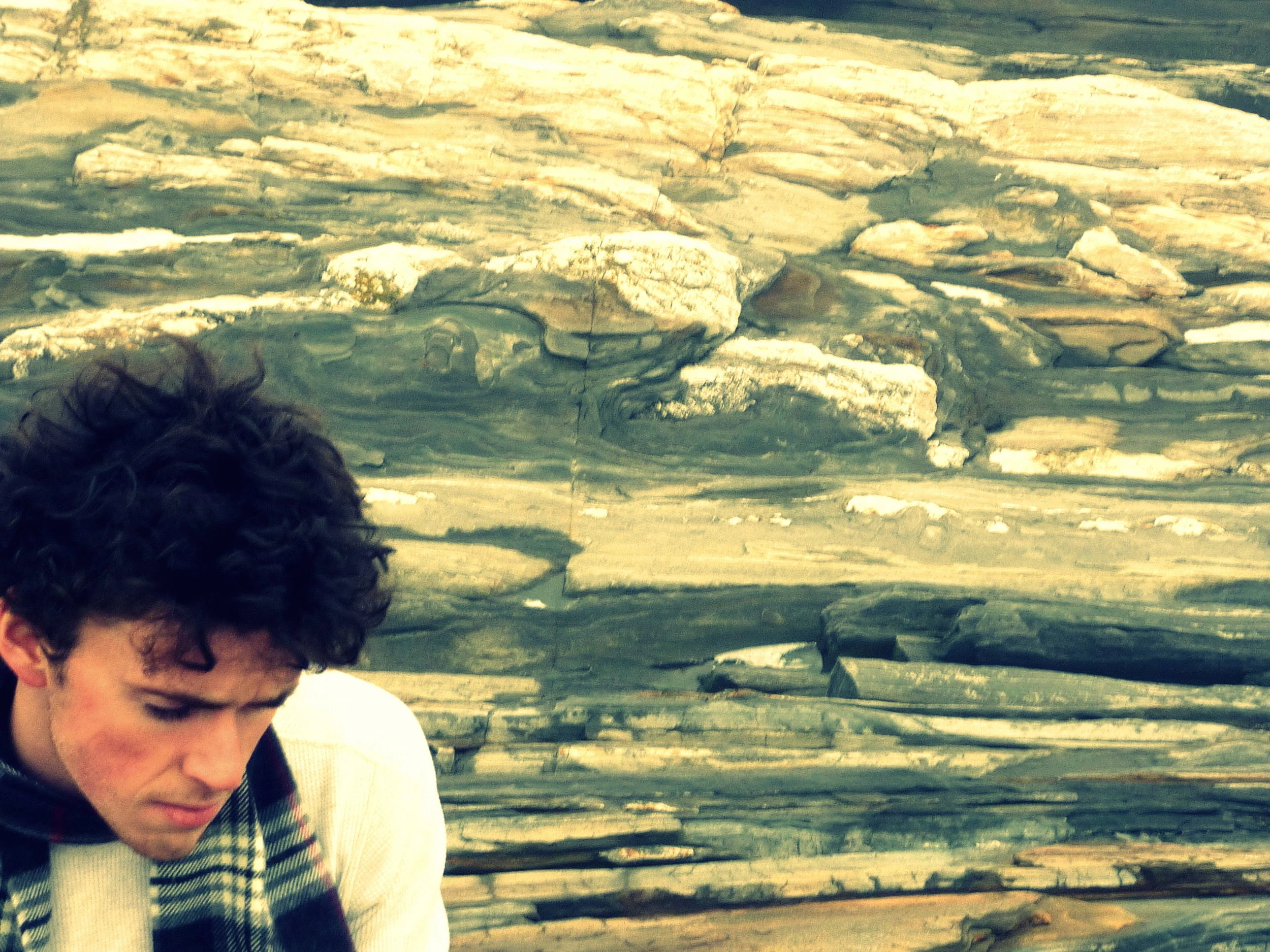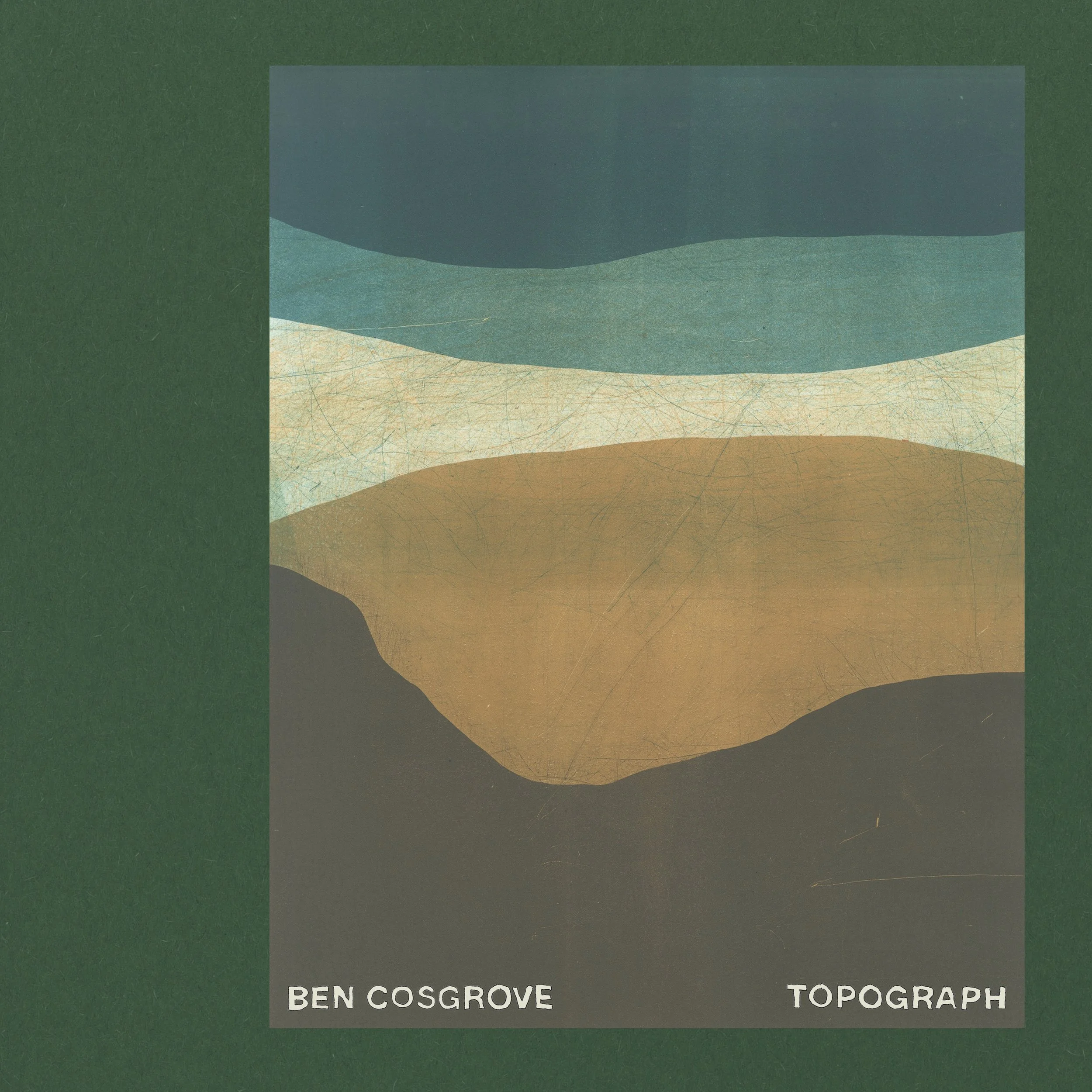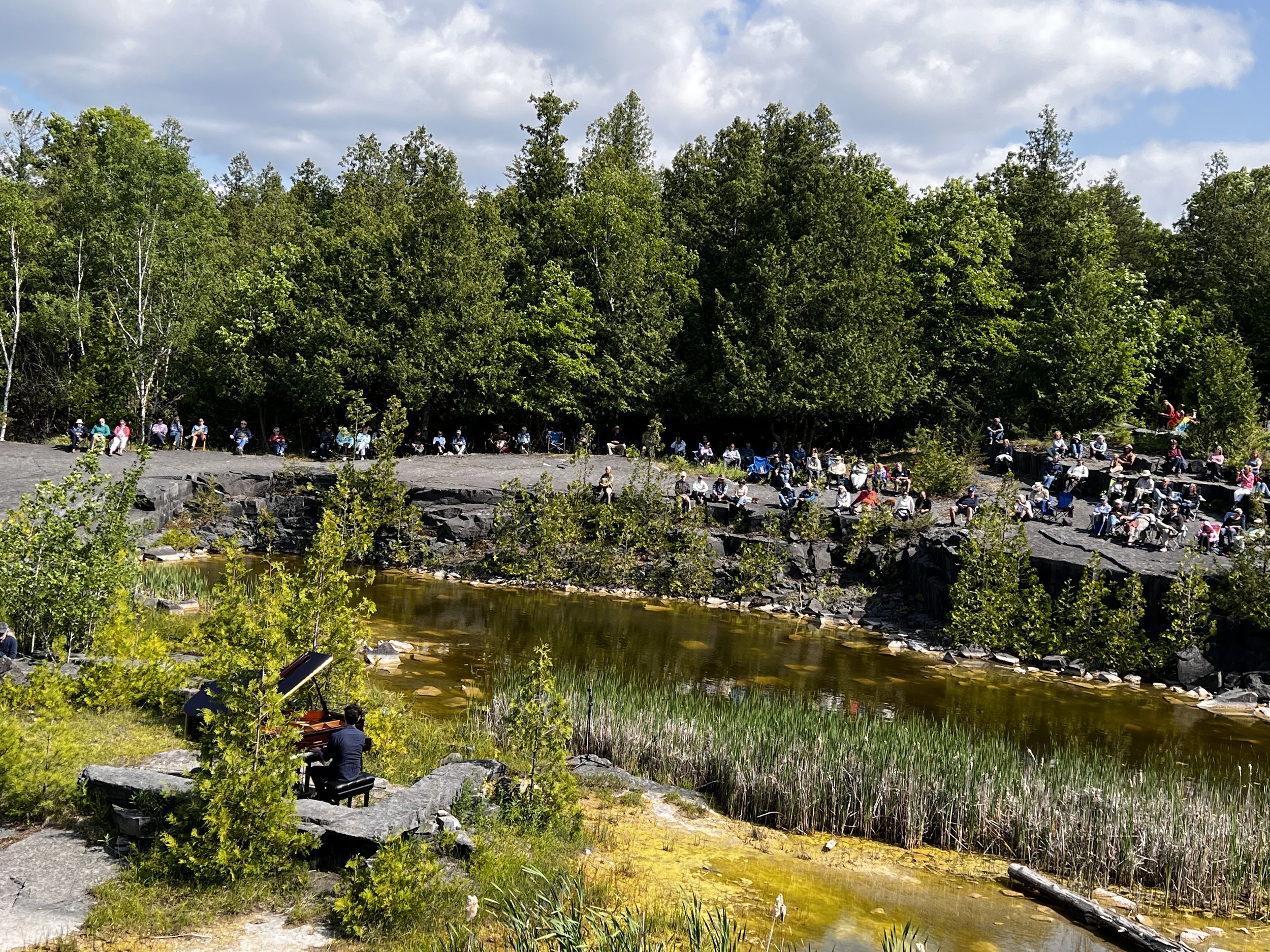BIOGRAPHY
Image credit: James Napoli
Ben Cosgrove is a traveling composer, pianist, and multi-instrumentalist based in northern New England. He performs regularly all over the country, presenting a unique variety of original instrumental music that explores themes of landscape, geography, and environment while straddling a line between the folk and classical genres. “Geography is Cosgrove’s muse,” writes the Boston Globe. “Like a sonic plein-air painter, [he] uses his piano as a paintbrush — and he’s made a name for himself doing it.” Ben’s “electric and exhilarating” solo piano performances are at once dazzling and intimate: music that has been described as “stunning” and “compelling and powerful,” — Red Line Roots has called him “stupidly talented” — all presented with “warmth, humor, honesty, and the easy familiarity of a troubadour.” Sound of Boston described him as "an expert at painting sonic portraits of curious, unexpected places."
Throughout his career, the strongest forces guiding Ben’s composition and performances have been his deep and abiding interests in environment, place, and geography. For years, he has been fascinated and inspired by the different ways people understand and interact with the landscapes around them, and through songs with names like “Prairie Fire,” “Overpass,” “Champlain,” “Kennebec,” “Volcano,” and others, he seeks to explore those relationships and reflect them in sound. “I don’t think of my pieces as rendering places in music,” he once remarked during an interview with Harvard Magazine, “but more just as a way of responding to places musically. Writing music just turns out to be a great way for me to process the world.”
Cover art for Topograph (2026)
Cosgrove’s latest album Topograph, set for release on January 30th, 2026, represents the latest chapter in a career that to date has included solo performances in 49 states (all but Delaware), as well as artist residencies and collaborations with institutions including NASA, Acadia, Isle Royale, Glacier, and Hawaiʻi Volcanoes National Parks; White Mountain National Forest; the Schmidt Ocean Institute; the Sitka Center for Art and Ecology; Chulengo Expeditions; the Upper Mississippi National Wildlife & Fish Refuge; the New England National Scenic Trail; and the Connecticut River Museum. The sixteen new songs on Topograph are inspired by landscapes of tumult and change — instances of “water and air moving land around,” in Cosgrove’s words. The resulting album is as lush and diverse as the scenes and processes that inspire it: strings, horns, accordions, percussion, and even voices swell in and out around Cosgrove’s piano to illustrate scenes of moving islands, eroding dunes, collapsing hillsides, and landscapes being made and unmade.
Image credit: Caitlin Tam
Cosgrove has described himself as a musician suspended somewhere between genres: “I’m either a singer-songwriter who doesn’t sing, or I’m a composer who behaves like a singer-songwriter,” he has said, and his chatty, disarming stage presence would certainly make him seem more like a folk musician than a classical pianist. In addition to his solo instrumental work, Cosgrove regularly tours, records, and collaborates with artists from across the worlds of folk, rock, and Americana music, and while much of his music recalls the work of George Winston, Keith Jarrett, Nils Frahm, or Ludovico Einaudi, his years of experience operating in the worlds of folk, pop, and Americana/roots music are reflected in many of his songs’ more impassioned and percussive moments. “His music is quintessentially American, omnivorous, and democratic,” writes Yankee Magazine. “It incorporates elements of classical, folk, country, blues, pop, et cetera, and can be by turns meditative and chaotic, somber and exuberant, lovely and frightening, still and dynamic. There are times it feels like his pieces are blowing in off the water, or rising from the earth in a swell, a surge, spinning eddies off the edges. There are times when they feel like they’re coming from the sky. […] There is nothing else like it.”
Topograph’s immediate predecessor, Bearings, was released in 2023. To write that album, Cosgrove relied on an improvisation-focused compositional style that aimed to reflect the real experience of learning topographical space through movement. “I’ve always been a bit obsessed with motion,” writes Cosgrove in its liner notes, “and I liked the idea of forcing myself to write a whole record on the move, leaving no opportunity to overthink the songs before they had a chance to breathe. And conceptually, there was something about having to find a song in the moment by moving around the piano — feeling out its contours like you might learn those of a landscape by walking across it — that felt important and true to the way I engage with the world in the rest of my life.” While this approach unifies the album, the landscapes and ideas that inspire its songs range from Hawaiian volcanoes to Kansas skies, and from Midwestern rail yards to the writings of landscape scholar J.B. Jackson.
Cover art for The Trouble With Wilderness (2021)
This diversity of sound is especially notable on his 2021 album, The Trouble With Wilderness, a set of twelve lush and textured pieces released in 2021 that each considered moments of ambiguity and overlap between the built and natural environments. His most successful album to date at the time of its release, Wilderness was featured as the subject of an episode of the NHPR show Outside/In, was deemed one of the best new releases of spring 2021 by WBUR, and was called "beautiful and fascinating" (The Maine Edge), "instant relief" (The Boston Globe), "deeply impressive" (Independent Clauses), and "immediately evocative and fully arresting... brim[ming] with technical mastery and emotional capital" (Seven Days).
Wilderness was preceded in turn by 2017′s Salt — “a breakup album about estuaries,” as Ben has described it onstage — in which he explored feelings of ambiguity, ungroundedness, and loss by writing quiet, shifting, and intense music for piano and guitar inspired by salt marshes, fault lines, tidal rivers, and other landscapes that exist in a constant state of flux. Seven Days called the album a “majestic entry into the composer’s catalog… replete with near-imperceptible embellishments and forward-thinking concepts,” and Junction described it as “a poetry of tones and turns and motion and play that transcends everyday language[...] it’s a breakup album, and it’s also a salve.”
Image credit: Matt Cosby
In addition to his solo work, Ben has performed and recorded with a wide variety of other artists from across the spectrums of folk, classical, jazz, and rock music, composed string and horn arrangements for other artists' projects, and he has contributed music to projects by clients including Florentine Films, Grand Teton National Park, Glacier National Park, Katmai National Park & Preserve, New Hampshire Public Radio, Bristlecone Media, the Conservation Media Group, and the Harvard-Smithsonian Center for Astrophysics. In 2016, his piece “Carrying Capacity,” a string work inspired by ecological data collected at Isle Royale National Park, was premiered by Wild Shore New Music at their annual festival in Homer, Alaska and then performed at Park Service sites in New York City and Washington, DC. In 2022, he joined forces with the New Hampshire writer Howard Mansfield to create and perform A Journey to the White Mountains in Words and Music, a stage production combining Mansfield’s words with Cosgrove’s music, which the two then performed in theaters around the state; a film version of the project was the winner of a 2024 New England Emmy in the Historical/Cultural Longform category. Finally, Ben has collaborated, performed, and recorded with a diverse array of other musicians that includes The Ghost of Paul Revere, Charlie Parr, Max García Conover, Darlingside, GoldenOak, The Ballroom Thieves, Connor Garvey, Caroline Cotter, Steph Jenkins, Maya De Vitry, Joel Thetford, The Social Animals, Town Meeting, Kaiti Jones, Avi Jacob, David Berkeley, Ditchbird, Jake Swamp and the Pine, Jamie Kallestad, Griffin William Sherry, the Maine Youth Rock Orchestra, and Palaver Strings.
A 2023 performance in a former quarry in Essex, New York
Ben also writes short nonfiction, and his essays about sound, art, landscape, and place have been published by Orion, Appalachia, Northern Woodlands, Taproot, Wildsam Guides, Literary North, The Harvard Advocate, The Island Review, Maine Farms, and land that i live. His essay “A Space Filled With Moving” was published as a chapbook by Literary North in 2019. He is a former Middlebury Fellow in Environmental Journalism, in which capacity he researched and wrote about the relationship between sense of place and the conservation of natural soundscapes in national parks. Additionally, Ben has been the Signet Society Artist-in-Residence at Harvard University, a fellow at the Vermont Studio Center and Willapa Bay AiR, and the recipient of both a New England Music Award and the St. Botolph Club Foundation Emerging Artist Award. He sits on the board of the Northern Woodlands Education Center and has spoken about art, environment, ecology, and place at primary schools, colleges, and universities, at the annual meeting of the Association of Environmental Studies and Sciences, at the Northern Woodlands Annual Conference, at the 2021 Maine Land Conservation Conference, at the Appalachian Mountain Club’s Annual Summit, at NASA’s 2023 Exploration Science Festival, and at the 2017 Princeton Graduate Student Conference on Water and the Making of Place in North America. He also developed and has taught the workshops "Reflecting Place in Music" and “Music of the Landscape” several times at the Sitka Center for Art & Ecology on the Oregon coast.
For bookings, commissions, and other inquiries, please reach out here.
Within New England, fee support for Ben Cosgrove may be available to nonprofit organizations through the New England States Touring (NEST) program of the New England Foundation for the Arts.
PRESS
Yankee Magazine: “Ben Cosgrove Gets Lost” (2025)
Outside/In: “The Trouble With Music About Wilderness” (audio) (2021)
WBUR The ARTery — Ben Cosgrove Makes Music For the Life Between the Cracks (2021)
Songscapes Podcast — Ben Cosgrove: Utterly Disorienting and Totally Exhilarating (audio) (2021)
Junction Magazine — Ben Cosgrove: A Space Filled With Moving (2019)
Redefine Rock interview (audio) (2018)
Boston Voyager interview (2018)
Red Line Roots — Ben Cosgrove: Shifting Landscapes (2017)
Sound of Boston — Album Review: Salt (2017)
WGDR interview (2015)
“[Cosgrove’s] music is quintessentially American, omnivorous, and democratic. It incorporates elements of classical, folk, country, blues, pop, et cetera, and can be by turns meditative and chaotic, somber and exuberant, lovely and frightening, still and dynamic. There are times it feels like his pieces are blowing in off the water, or rising from the earth in a swell, a surge, spinning eddies off the edges. There are times when they feel like they’re coming from the sky. […] There is nothing else like it.” - Yankee Magazine
“Geography is Cosgrove’s muse. Like a sonic plein air painter, [he] uses his piano as a paintbrush — and he’s made a name for himself doing it… Like Brian Eno’s “Ambient 1: Music for Airports,” [Cosgrove’s] piano-driven compositions all but prompt you to take three deep breaths.” - The Boston Globe
“Cosgrove’s compositions… are lush and alluring, and veritably breathe with the pulses and rhythms of the environment, while subtly acknowledging and commenting upon the complex relationship between humanity and the earth we inhabit.” - Rogovoy Report
"Don’t be fooled by the serene scene of Salt’s cover. This is a sharp inhale on a cold winter day: tense & beautiful & alive at once. Ben Cosgrove's music conveys its feeling as urgently as if he were screaming—except his language of choice is soft piano keys & guitar strings." - Sound of Boston
"Cosgrove is a mesmerizing piano player and his compositions in response to landscape make you look at the world more attentively." - Red Line Roots
“A master at painting sonic portraits of curious, unexpected places.” - Sound of Boston
“His melodies drift across haunting northern expanses amid polished arrangements, often gradually decomposing as chaos creeps in underneath. The music stirs intimate feelings of loneliness and homesickness, as well as taking on bigger places, distance, and a greater sense of history… these musical journeys evoke the melancholy and the frantic disorientation of departure, transit, and return.” – Harvard Magazine
“[Cosgrove] seemingly has the ability to play, and play well, any instrument he touches.” – Duluth News-Tribune (MN)
“An accomplished artist who has found a unique niche in music… Cosgrove combines an interest in the natural world with a remarkable musical ability to create albums and concerts that blend the two experiences..”– Huntington Herald-Dispatch (WV)
“Stupidly talented.” – Red Line Roots
“Cosgrove’s performance was captivating: we were amazed by how well his stunning original compositions and charming stage presence played to an audience accustomed to folk and bluegrass music.” -Tamworth Lyceum (NH)
"A moody exercise in restraint and excess; the composer's attention to space and atmosphere conveys as much emotional information as do the actual notes he plunks out... [w]hile it's easy to get lost in innovative chord progressions and dazzling finger work, Cosgrove's use of negative space and subtle, perhaps insignificant, details are just as striking. Replete with near-imperceptible embellishments and forward-thinking concepts, Salt is a majestic entry into the composer's catalog."
– Seven Days (VT)
“A physically emotive pianist" - Portland Press-Herald
“Even more impressive is his technical proficiency as a multi-instrumentalist — in his recorded music, his fingers glide across the piano keys, climbing arpeggio stairs; a guitar or trumpet will come in with a well-placed solo and just as effortlessly fade away.” – Sound of Boston
“His love of nature and community shines through in sprawling piano compositions that conjure images of familiar things. His work deftly transports the audience to a place they’ve never been or a place they’ve called home.” — Monadnocker Magazine
“His profound interest in place, landscape and geography has resulted in an album of lush compositions that paint an impressionistic musical portrait… From the avant-garde “Little Rain” to the solo piano work on “Abilene,” [Field Studies] offers up musical colors that reflect both Cosgrove’s own emotions and the grandeur of the landscapes encountered on his journeys.”– Merrimack Valley Magazine
“Compelling and powerful” -The Harvard Crimson
“Cosgrove’s production and instrumentation is electric, tautly spare, and multilayered… recall[s] the feeling of a wide open dome of sky, of driving in the American West.” – Portland Phoenix (ME)
“[Field Studies] is a staggering work of resplendent beauty.” -ResidentMediaPundit
“The composer/performer displays an astonishing versatility in crafting his instrumental tracks: he builds them from piano, guitar, mandolin, banjo, trumpet, trombone, upright bass, and dynamic percussion, all of which Cosgrove plays, records, and mixes himself.” – Harvard Magazine







